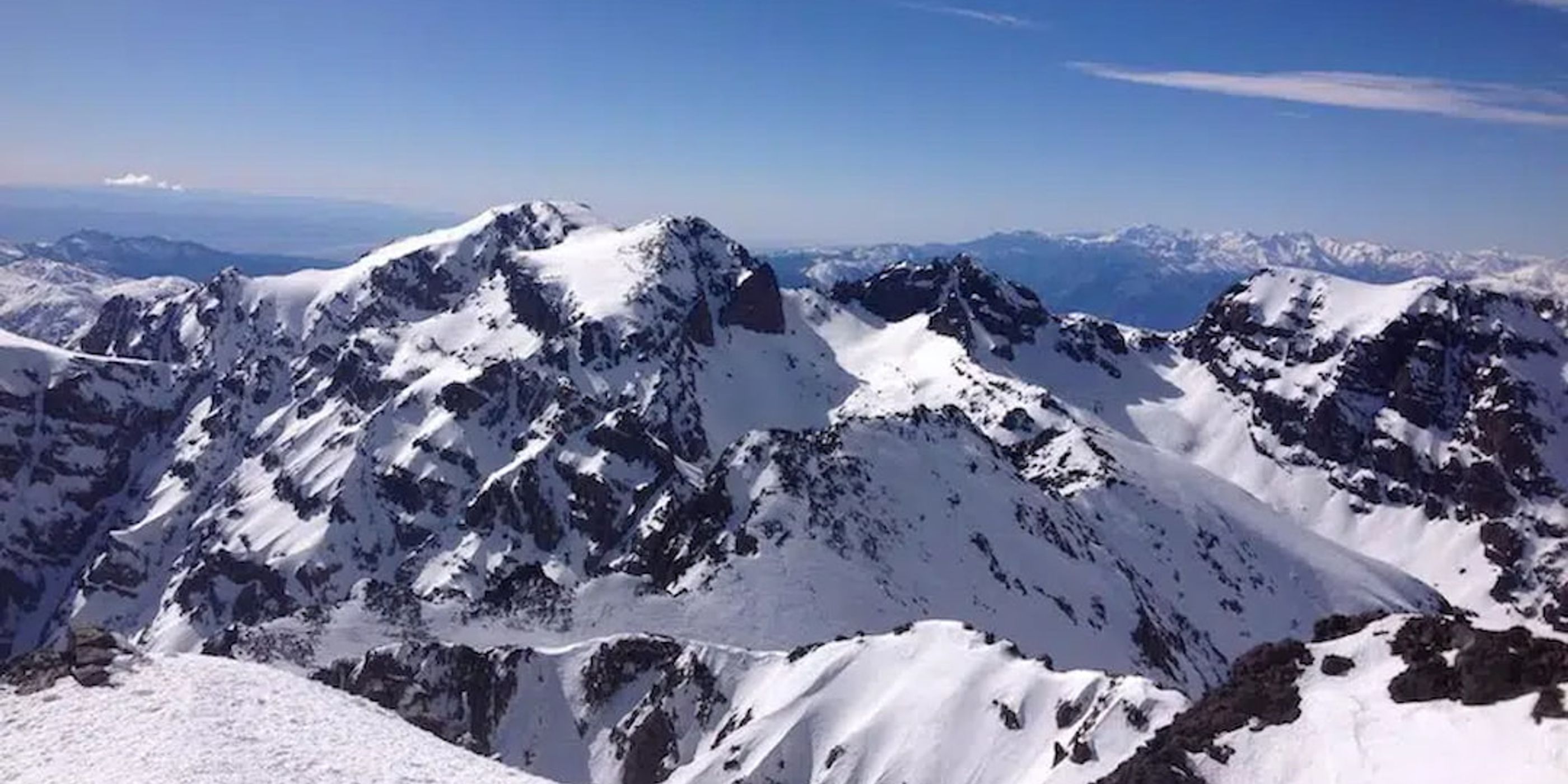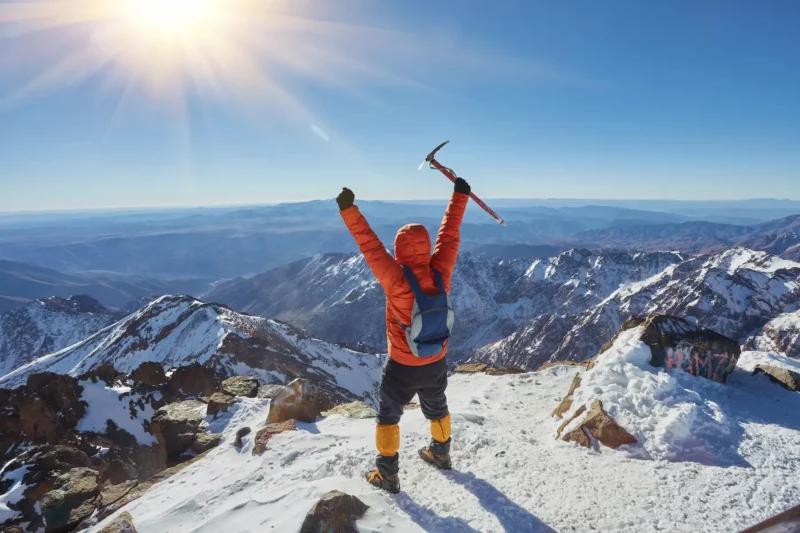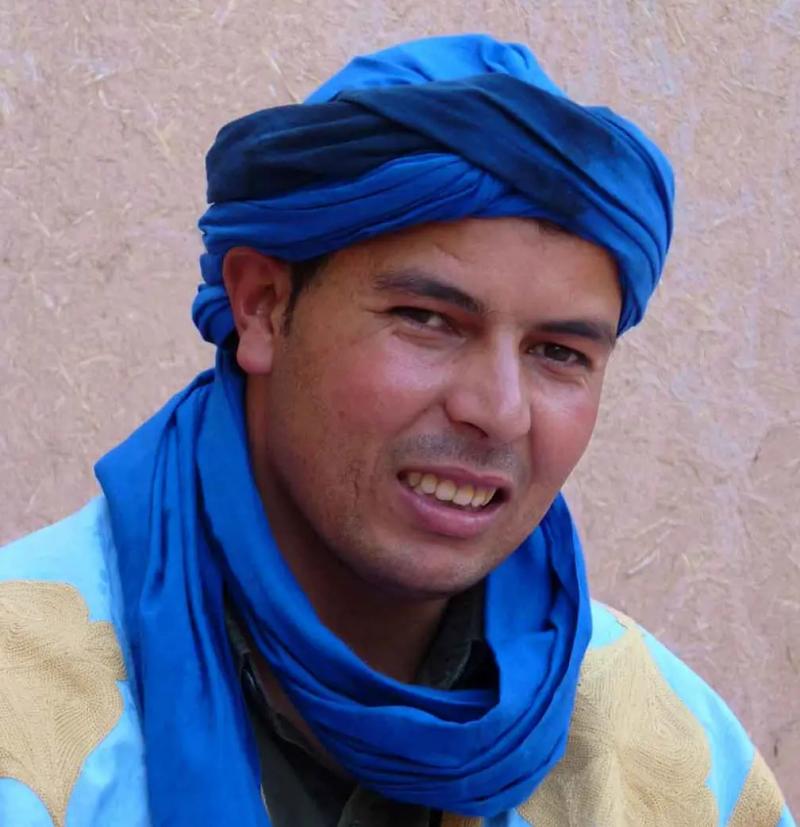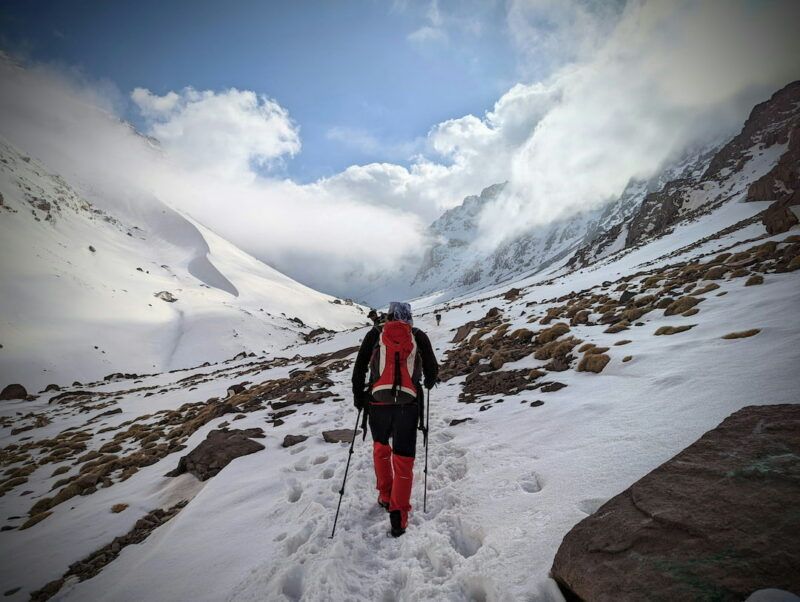
Toubkal Altitude Sickness - Should You Be Concerned?
What is Altitude Sickness?
Altitude sickness, or acute mountain sickness (AMS), can occur at high altitude. Air pressure drops as you go higher, so there’s less oxygen per breath.
Your body can adapt, but it needs time to adjust. Read on for everything you need to know about Toubkal altitude sickness.
Climb Mount Toubkal with Call to Adventure and know you’re in good hands.
Or if you fancy a winter trip click here to learn more Mount Toubkal Winter Climb

The good news is your body can adapt to the lower oxygen levels but it needs time to do this. That’s why big mountains like Everest are climbed in stages, with climbers going back and forth between the lower camps before making the final summit push.
Sometimes the body can’t keep up—especially if you go too high, too fast. Fitness helps you feel better on the trail, but it doesn’t make you immune to AMS. Even if you’ve been fine at altitude before, you could still get AMS on a future climb.
The worst-case scenario for altitude sickness is if it's ignored, it can develop into High Altitude Pulmonary Edema (HAPE), where fluid develops in your lungs, or High Altitude Cerebral Edema (HACE), where fluid develops in your brain.
If these sound nasty, they are - and they can be fatal.
Mount Toubkal Altitude Sickness - So, Should You be Concerned?
The good news is - no, you shouldn't worry but you should be prepared.
Serious altitude sickness on Toubkal and in the High Atlas Mountains is extremely rare.
Our founder George recently chatted with Jamal, the guide who leads our Mount Toubkal treks, and in his 30-plus years of experience, he has not had a single case of severe altitude sickness among trekkers. Even if you do get symptoms they will most likely be mild and all you need to do is descend back down with the guide.

So remember - it’s not something you need to worry about.
Okay, as with all mountain environments above a certain height, there is a chance you could get altitude sickness. But all you need to do is descend and you should be fine. Jamal makes sure his staff are all trained to spot the symptoms of altitude sickness and how to manage it.
The standard route sleeps at the Toubkal Refuge (roughly 3200m) and tops out at 4167m. AMS risk generally starts above 2500m, so we manage it with a sensible pace, an overnight at the refuge, and close guide supervision.
Want more tips and wisdom from Jamal? Check out our Ultimate Guide to Toubkal.
What are the Symptoms of Severe Altitude Sickness?
Although your guides will be keeping an eye on you and it’s very unlikely you’ll have any serious problems, you should know the symptoms.
Common AMS symptoms (usually mild)
- Headache
- Fatigue and low energy
- Nausea or reduced appetite
- Breathlessness that feels a bit more than “just walking uphill”
Dizziness or poor sleep
Red flags (stop ascending; inform your guide immediately)
- Severe headache not improving with rest/medication
- Confusion, clumsiness, or trouble walking in a straight line
- Shortness of breath at rest, persistent cough, chest tightness, or “wet”/gurgly breathing
- Worsening symptoms despite rest
Do you Need to Acclimatise to Climb Mount Toubkal?
Proper acclimatisation lets your body adjust to thinner air and is the best prevention for AMS.
For Toubkal, we start lower in Imlil and spend the night at the refuge before summit day. That overnight is a helpful step. If you want to be extra cautious, consider:
- Arriving a day earlier and taking an easy warm-up hike
- Doing a short “climb high, sleep low” acclimatisation walk from the refuge (conditions allowing)
- Keeping the pace steady and drink water regularly
How to Treat Altitude Sickness?
The best way to treat altitude sickness and alleviate headaches and other symptoms is to descend immediately to a lower altitude. And even better than cure is prevention. Don't push through symptoms that suggest severe AMS.
In the unlikely event you do get more severe altitude sickness symptoms when climbing Mount Toubkal, our guides will get you to a lower altitude and assess your symptoms.
You're very unlikely to have further issues and once you’re back down to lower altitude you’ll be fine. But like we say, it’s rare you’ll get even mild symptoms anyway.

Staying Safe on your Mount Toubkal Trek
Serious altitude sickness is unlikely to be a problem, but there are other dangers to be aware of when climbing Toubkal and trekking in the Atlas Mountains.
Check mountain weather forecasts and make sure you’re prepared for all weather conditions.
Take warm layers, hat and gloves even in summer and plenty of warm layers. Make sure you follow your guide’s instructions at all times and stay with the group - no soloing off.
Last minute
Make sure you have travel insurance that covers you for emergencies. We recommend Rise and Shield.
Bring enough cash and maybe a credit card as a backup for unexpected expenses.
Be flexible and prepared for changing conditions on the mountain.
Climbing Toubkal is an adventure of a lifetime and you’ll see some stunning scenery.
Remember - it’s very unlikely you’ll have any serious problems so just enjoy your trek in the Atlas Mountains and your climb of North Africa’s highest peak.
Ready to summit Mount Toubkal with us?
We handle all the logistics, just turn up and trek!
Click the links below to learn more:
Mount Toubkal Trek
Additional source:
About the Author

George Beesley
Adventure Lover & Founder of Call To Adventure
George just bloody loves a bit of adventure! Imagine someone who not only hikes up mountains for breakfast but also bikes across continents. Got a case of wanderlust? This guy's been to over 50 countries and comes back with stories that'll make your grandma want to go bungee jumping.
![Climb Mount Toubkal Tips From Local Expert [30 Years Experience]](https://cdn.sanity.io/images/f5ovd1ei/production/583602f19db9ccc67b832053ccba8ca25e090833-1660x1067.webp?w=80&h=80&fit=crop&auto=format)

